牛津译林版2020选择性必修第一册Unit 2 The Universal Language Grammar and usage课件(共34张)
文档属性
| 名称 | 牛津译林版2020选择性必修第一册Unit 2 The Universal Language Grammar and usage课件(共34张) |
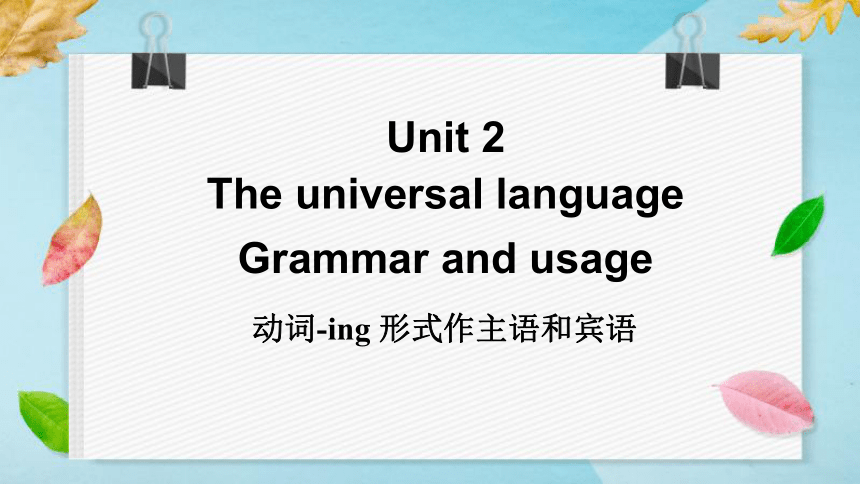
|
|
| 格式 | pptx | ||
| 文件大小 | 2.0MB | ||
| 资源类型 | 教案 | ||
| 版本资源 | 牛津译林版(2019) | ||
| 科目 | 英语 | ||
| 更新时间 | 2024-10-12 00:00:00 | ||
图片预览



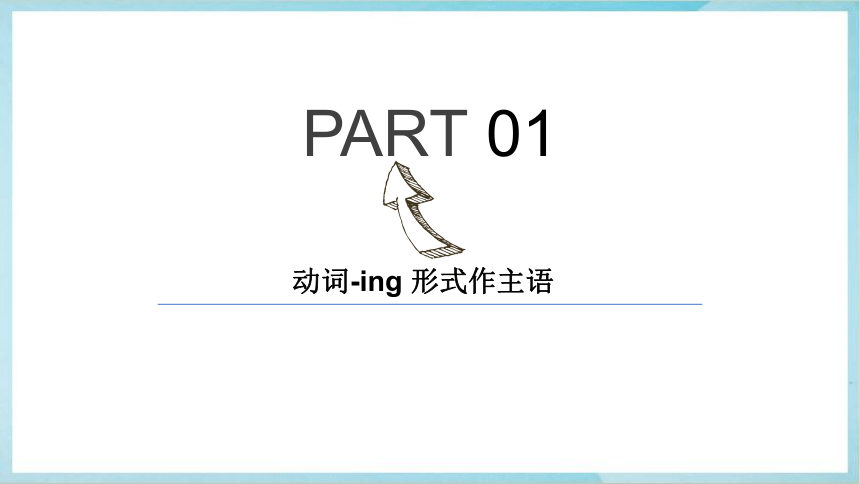
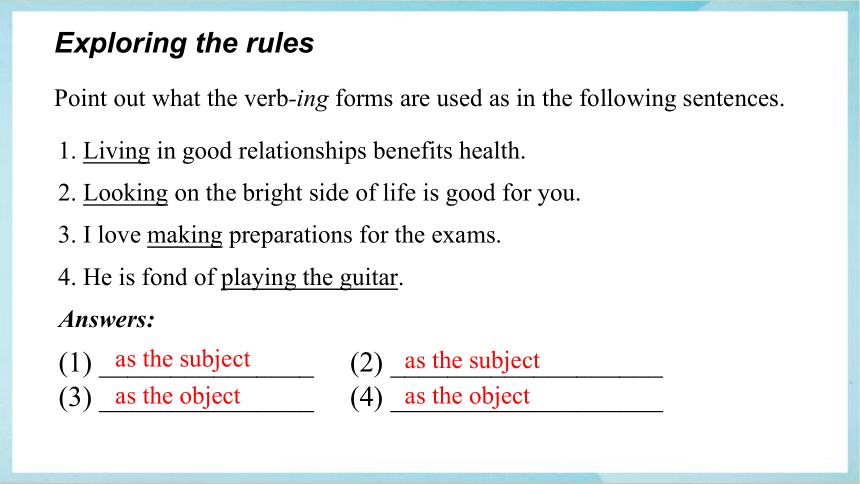

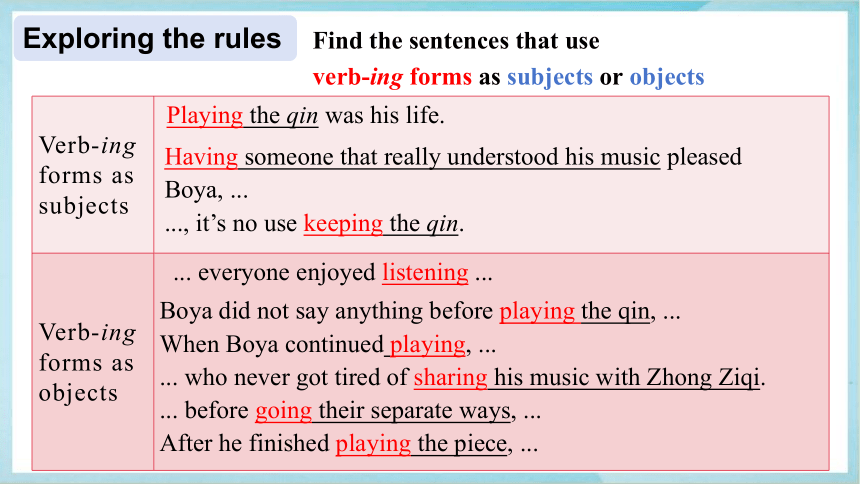
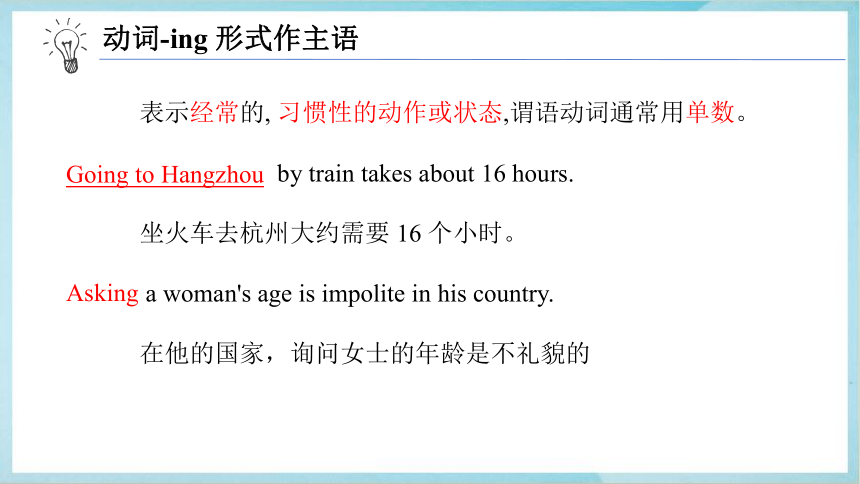
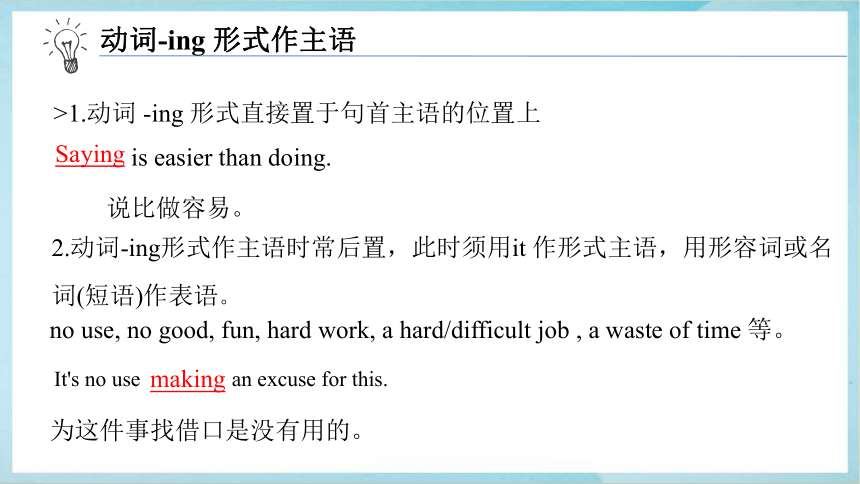
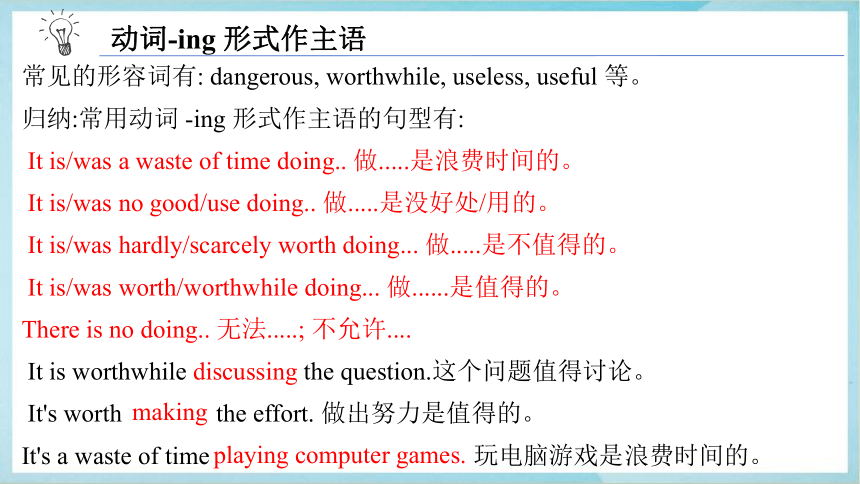
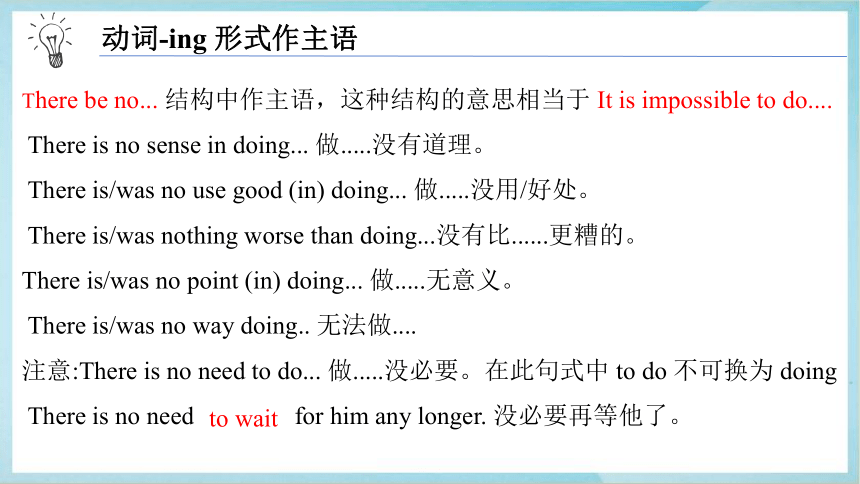
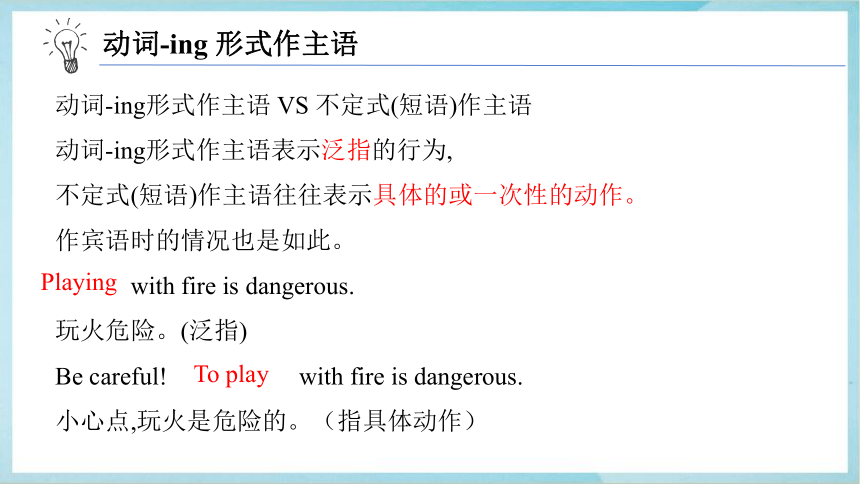
文档简介
(共34张PPT)
动词-ing 形式作主语和宾语
Unit 2
The universal language
Grammar and usage
By the end of this section, you will be able to:
1.identify the use of verb-ing forms as subjects and objects;
2.work out the rules of verb-ing forms as subjects and objects;
3.apply verb-ing forms in new situations.
CONTENTS
1
2
动词-ing 形式作主语
动词-ing 形式作宾语
PART 01
动词-ing 形式作主语
1. Living in good relationships benefits health.
2. Looking on the bright side of life is good for you.
3. I love making preparations for the exams.
4. He is fond of playing the guitar.
Exploring the rules
Point out what the verb-ing forms are used as in the following sentences.
Answers:
(1) _______________ (2) ___________________
(3) _______________ (4) ___________________
as the subject
as the subject
as the object
as the object
In China’s Spring and Autumn and Warring States periods, there lived a man named Boya, who was a master of the qin. Playing the qin was his life. He played so well that everyone enjoyed listening to his music and thought highly of his techniques. However, Boya believed no one could understand his music until he met Zhong Zigi. Boya did not say anything before playing the qin, yet Zhong Ziqi was able to paint a picture of great mountain ranges in his mind. When Boya continued playing, Zhong Ziqi said he had heard the sound of a river flowing quickly. In fact, Boya had intended to call the piece High Mountains and Flowing Water. Having someone that really understood his music pleased Boya, who never got tired of sharing his music with Zhong Ziqi. The two soon became great friends and before going their separate ways, they agreed to meet at the Mid-Autumn Festival the next year. However, Zhong Ziqi failed to show up on that day. When Boya learnt about Zhong Ziqi’s death, he was overcome with sorrow. He played High Mountains and Flowing Water in front of Zhong Ziqi’s grave. After he finished playing the piece, he destroyed the qin and said, “Since the only person that understands my music is gone, it’s no use keeping the qin.”
Exploring the rules
Verb-ing forms as subjects Playing the qin was his life.
Verb-ing forms as objects ... everyone enjoyed listening ...
Having someone that really understood his music pleased Boya, ...
..., it’s no use keeping the qin.
Boya did not say anything before playing the qin, ...
When Boya continued playing, ...
... who never got tired of sharing his music with Zhong Ziqi.
... before going their separate ways, ...
After he finished playing the piece, ...
Exploring the rules
Find the sentences that use
verb-ing forms as subjects or objects
动词-ing 形式作主语
表示经常的, 习惯性的动作或状态,谓语动词通常用单数。
by train takes about 16 hours.
坐火车去杭州大约需要 16 个小时。
a woman's age is impolite in his country.
在他的国家,询问女士的年龄是不礼貌的
Going to Hangzhou
Asking
Lorem Ipsum
Lorem Ipsum is simply dummy text of the printing. Lorem Ipsum is simply dummy text of the printing.
动词-ing 形式作主语
>1.动词 -ing 形式直接置于句首主语的位置上
is easier than doing.
说比做容易。
2.动词-ing形式作主语时常后置,此时须用it 作形式主语,用形容词或名词(短语)作表语。
no use, no good, fun, hard work, a hard/difficult job , a waste of time 等。
It's no use an excuse for this.
为这件事找借口是没有用的。
Saying
making
常见的形容词有: dangerous, worthwhile, useless, useful 等。
归纳:常用动词 -ing 形式作主语的句型有:
It is/was a waste of time doing.. 做.....是浪费时间的。
It is/was no good/use doing.. 做.....是没好处/用的。
It is/was hardly/scarcely worth doing... 做.....是不值得的。
It is/was worth/worthwhile doing... 做......是值得的。
There is no doing.. 无法.....; 不允许....
It is worthwhile discussing the question.这个问题值得讨论。
It's worth the effort. 做出努力是值得的。
It's a waste of time 玩电脑游戏是浪费时间的。
动词-ing 形式作主语
making
playing computer games.
动词-ing 形式作主语
There be no... 结构中作主语,这种结构的意思相当于 It is impossible to do....
There is no sense in doing... 做.....没有道理。
There is/was no use good (in) doing... 做.....没用/好处。
There is/was nothing worse than doing...没有比......更糟的。
There is/was no point (in) doing... 做.....无意义。
There is/was no way doing.. 无法做....
注意:There is no need to do... 做.....没必要。在此句式中 to do 不可换为 doing
There is no need for him any longer. 没必要再等他了。
to wait
动词-ing 形式作主语
动词-ing形式作主语 VS 不定式(短语)作主语
动词-ing形式作主语表示泛指的行为,
不定式(短语)作主语往往表示具体的或一次性的动作。
作宾语时的情况也是如此。
with fire is dangerous.
玩火危险。(泛指)
Be careful! with fire is dangerous.
小心点,玩火是危险的。(指具体动作)
Playing
To play
PART 02
动词-ing 形式作宾语
动词-ing 形式作宾语
两种情况
1.只能后接动词 -ing 形式作宾语的动词:
avoid, admit, appreciate, consider, enjoy, deny ( 否定), delay(延期), escape(逃避), excuse, keep, finish, fancy (梦想), suggest, imagine, mind, miss, practise, risk(冒险)等。
口诀:
避免错过少延期(avoid, miss, delay)
建议完成多练习(advise, finish, practise)
喜欢想象禁不住(enjoy, imagine , can't help)
承认否定与嫉妒(admit, deny, envy)
逃避冒险莫原谅(escape, risk, excuse)
忍受保持不介意(stand, keep, mind)
People can't help laughing at that foolish man.
人们忍不住嘲笑那个愚蠢的人。
need, demand, want, require, 在表示“需要”时,用动词-ing形式的主动形式表被动意义,或用不定式的被动形式。
Need/demand/want/require + doing
=need/demand/want/require + to be done
The car needs repairing= The car needs to be repaired.
动词-ing 形式作宾语
有一些动词短语也常跟动词-ing形式作宾语,如:
insist on (坚持), object to (反对), be good at, lead to, leave off (停止), put off (推迟), give up, look forward to , feel like(想要), devote to (把......奉献给),get used to (习惯于), pay attention to, can't help (禁不住), can't stand (受不了)等。
2.既可接动词-ing形式又可接不定式(短语)作宾语的动词:
begin, start, continue, like, dislike, love, prefer, mean , forget , remember , hate , regret 等。
(1)在 like, love, hate, prefer 等动词之后,用动词 -ing
形式或不定式意义上没有什么不同,只是侧重点有些不同,动词-ing形式表示泛指的动作,不定式表示具体的一次性动作。
(2)在 begin, start, continue 之后,用动词 -ing 形式和不定式,意义无区别,尤其是当主语是人的时候。
(3)在动词 forget, remember, regret 之后,用动词 -ing形式与不定式意义不同。
动词 -ing形式表示动作已经发生;不定式表示动作还没发生。
I remember to post the letter. 我会记得去寄出这封信。
I remember posting the letter. 我记得这封信已经寄出去了。
动词-ing 形式作宾语
try to do sth. 设法做某事
try doing sth. 试试做某事
mean to do sth. 打算/有意要做某事
mean doing sth.意思是/意味着做某事
be used to doing sth. 习惯于做某事
be used to do sth. 被用来做某事
can't help doing sth. 禁不住做某事
can't help to do sth. 不能帮助做某事
go on doing sth.继续做一直在做的事
go on to do sth. 接着做另一件事
stop doing sth. 停止做某事
stop to do sth. 停下正在做的事去做另一件事.
He remembered being introduced to the girl at a party.
他记得在一次聚会上被介绍给了那个女孩。
I don’t regret telling her what I thought。我不后悔给她讲过我的想法。
I regret to have to do this, but I have no choice.我很遣憾必须这样去做,我实在没办法。
动词-ing 形式作宾语
>在 allow, permit, forbid, advise, consider 后直接跟动词 -ing 形式作宾语;
如果后面有名词或代词作宾语,则用动词不定式作宾语补足语。
在 allow/permit/forbid/advise/consider+
His parents permitted him to join the army when he was seventeen.
在他17岁的时候。父母允许他去从军。
Sb to do sth
Doing sth
Working out the rules
When the verb-ing form is used as the subject of a sentence, we can sometimes use the preparatory subject (形式主语) (1) at the beginning of the sentence.
The verb-ing form can also be used as the object of a
(2) or a (3) .
verb
it
preposition
Circle the mistakes and write down the correct forms in the blanks.
1. Listen to music is my favourite thing to do.
2. I really enjoy to read biographies of musicians.
3. It’s no use try to play the violin if you’re not going to give
it your best shot.
4.Would you mind to teach me how to play the guitar
5. These instruments were meant for play traditional
Chinese music.
P21 B1
Listening
reading
trying
teaching
playing
Below is an article about the music sent into plete the article with the correct forms of the verbs in the brackets.
P21 B2
representing
to explore
Sending
choosing
selecting
lasting
playing
to enter
Exercises
1.Scientists have responded by _________ ( note ) that hungry bears may be congregating (聚集) around human settlement.
2. A 90-year-old woman has been awarded The Year” for _________ (be) Austrian's oldest full-time employee still working 40 hours a week.
3. She just kept __________ ( whisper) “1 can't believe you're here!”
4. You may drink, smoke, be overweight and still reduce your risk of _________ (die) early by cycling
noting
being
whispering
dying
5. I still remember _________( visit ) a Cantonese friend who'd lived here for five years.
6. ___________________(travel) along the old Silk Road is a pleasant and rewarding experience.
7. But unlike her school friends, 16-year-old Sarah is not spending half-term _________ (consume).
8. My ambassadorial duties will include___________( introduce ) Austrian visitors to the 120-plus pandas at Chengdu and others at a research centre in the misty mountains of Bifengxia.
visiting
Travelling/To travel
consuming
introducing
9. In addition to their plain beauty, what makes the adobe dwellings admirable is their ability to “air condition” a house without_________ (use) electric equipment
10. One morning, the native was waiting at the bus stop, worried about_________ (be) late for the meeting
11. The boy kept_________( ride ) . He was carrying something sour over his shoulder and shouting.
using
being
riding
1. __________ (return) to a book you’ve read many times can feel like drinks with an old friend. (2020全国卷I ·阅读理解B)
2. In the future, the team hopes ______________ (develop) a version of the technology that can be sprayed onto plant leaves in a one-off treatment that would last the plant’s lifetime. (2020·全国卷I·阅读理解D)
实战高考实战高考
Returning
to develop
3. ______ (use) emojis can add humor and feeling, keeping intention clear. (2020全国卷II)
4. ________(take) pictures of polar bears is amazing but also dangerous. (2020浙江·读后续写)
5. But some students didn't want ________ (wear) the uniform. (2019·浙江卷·语法填空)
Using
Taking
to wear
实战高考实战高考
6. Many of us equate (视……等同于) “commitment” with such “caring” occupations as teaching and nursing. But _______(do) any ordinary job as well as one can is in itself an admirable commitment. (2019天津·阅读理解D)
7. __________(learn) to think critically is an important skill today's children will need for the future. (2019天津)
doing
Learning
实战高考实战高考
表示_________________________,谓语动词通常用单数。
动词 -ing 形式直接置于句首__________的位置上
动词-ing形式作主语时常后置,此时须用it 作形式主语,用____________ __作表语。
动词-ing形式作主语表示_________的行为,
不定式(短语)作主语往往表示_________________________。
经常的, 习惯性的动作或状态
主语
形容词或名词(短语)
泛指
具体的或一次性的动作
Summary
1.只能后接动词 -ing 形式作宾语的动词:
a_______, ad______, app_________, con_______, en____, de_____ ( 否定)
void
mit
reciate
sider
joy
ny
2.need, demand, want, require, 在表示“需要”时,用动词-ing形式的____形式
表被动意义,或用不定式的被动形式。
主动
3.既可接动词-ing形式又可接不定式(短语)作宾语的动词:
be____, st____, con_____, l____, dis____, lo___, pre___, me___ , for___ , remem____ re______.
gin
art
tinue
ike
like
ve
fer
an
get
ber
gret
Summary
>在 allow, permit, forbid, advise, consider 后直接跟动词 -ing 形式作宾语;
如果后面有名词或代词作宾语,则用动词不定式作___________。
在 allow/permit/forbid/advise/consider+
His parents permitted him _______ the army when he was seventeen.
在他17岁的时候。父母允许他去从军。
Sb ___________
________sth
宾语补足语
to join
Doing
to do sth
Summary
动词-ing 形式作主语和宾语
Unit 2
The universal language
Grammar and usage
By the end of this section, you will be able to:
1.identify the use of verb-ing forms as subjects and objects;
2.work out the rules of verb-ing forms as subjects and objects;
3.apply verb-ing forms in new situations.
CONTENTS
1
2
动词-ing 形式作主语
动词-ing 形式作宾语
PART 01
动词-ing 形式作主语
1. Living in good relationships benefits health.
2. Looking on the bright side of life is good for you.
3. I love making preparations for the exams.
4. He is fond of playing the guitar.
Exploring the rules
Point out what the verb-ing forms are used as in the following sentences.
Answers:
(1) _______________ (2) ___________________
(3) _______________ (4) ___________________
as the subject
as the subject
as the object
as the object
In China’s Spring and Autumn and Warring States periods, there lived a man named Boya, who was a master of the qin. Playing the qin was his life. He played so well that everyone enjoyed listening to his music and thought highly of his techniques. However, Boya believed no one could understand his music until he met Zhong Zigi. Boya did not say anything before playing the qin, yet Zhong Ziqi was able to paint a picture of great mountain ranges in his mind. When Boya continued playing, Zhong Ziqi said he had heard the sound of a river flowing quickly. In fact, Boya had intended to call the piece High Mountains and Flowing Water. Having someone that really understood his music pleased Boya, who never got tired of sharing his music with Zhong Ziqi. The two soon became great friends and before going their separate ways, they agreed to meet at the Mid-Autumn Festival the next year. However, Zhong Ziqi failed to show up on that day. When Boya learnt about Zhong Ziqi’s death, he was overcome with sorrow. He played High Mountains and Flowing Water in front of Zhong Ziqi’s grave. After he finished playing the piece, he destroyed the qin and said, “Since the only person that understands my music is gone, it’s no use keeping the qin.”
Exploring the rules
Verb-ing forms as subjects Playing the qin was his life.
Verb-ing forms as objects ... everyone enjoyed listening ...
Having someone that really understood his music pleased Boya, ...
..., it’s no use keeping the qin.
Boya did not say anything before playing the qin, ...
When Boya continued playing, ...
... who never got tired of sharing his music with Zhong Ziqi.
... before going their separate ways, ...
After he finished playing the piece, ...
Exploring the rules
Find the sentences that use
verb-ing forms as subjects or objects
动词-ing 形式作主语
表示经常的, 习惯性的动作或状态,谓语动词通常用单数。
by train takes about 16 hours.
坐火车去杭州大约需要 16 个小时。
a woman's age is impolite in his country.
在他的国家,询问女士的年龄是不礼貌的
Going to Hangzhou
Asking
Lorem Ipsum
Lorem Ipsum is simply dummy text of the printing. Lorem Ipsum is simply dummy text of the printing.
动词-ing 形式作主语
>1.动词 -ing 形式直接置于句首主语的位置上
is easier than doing.
说比做容易。
2.动词-ing形式作主语时常后置,此时须用it 作形式主语,用形容词或名词(短语)作表语。
no use, no good, fun, hard work, a hard/difficult job , a waste of time 等。
It's no use an excuse for this.
为这件事找借口是没有用的。
Saying
making
常见的形容词有: dangerous, worthwhile, useless, useful 等。
归纳:常用动词 -ing 形式作主语的句型有:
It is/was a waste of time doing.. 做.....是浪费时间的。
It is/was no good/use doing.. 做.....是没好处/用的。
It is/was hardly/scarcely worth doing... 做.....是不值得的。
It is/was worth/worthwhile doing... 做......是值得的。
There is no doing.. 无法.....; 不允许....
It is worthwhile discussing the question.这个问题值得讨论。
It's worth the effort. 做出努力是值得的。
It's a waste of time 玩电脑游戏是浪费时间的。
动词-ing 形式作主语
making
playing computer games.
动词-ing 形式作主语
There be no... 结构中作主语,这种结构的意思相当于 It is impossible to do....
There is no sense in doing... 做.....没有道理。
There is/was no use good (in) doing... 做.....没用/好处。
There is/was nothing worse than doing...没有比......更糟的。
There is/was no point (in) doing... 做.....无意义。
There is/was no way doing.. 无法做....
注意:There is no need to do... 做.....没必要。在此句式中 to do 不可换为 doing
There is no need for him any longer. 没必要再等他了。
to wait
动词-ing 形式作主语
动词-ing形式作主语 VS 不定式(短语)作主语
动词-ing形式作主语表示泛指的行为,
不定式(短语)作主语往往表示具体的或一次性的动作。
作宾语时的情况也是如此。
with fire is dangerous.
玩火危险。(泛指)
Be careful! with fire is dangerous.
小心点,玩火是危险的。(指具体动作)
Playing
To play
PART 02
动词-ing 形式作宾语
动词-ing 形式作宾语
两种情况
1.只能后接动词 -ing 形式作宾语的动词:
avoid, admit, appreciate, consider, enjoy, deny ( 否定), delay(延期), escape(逃避), excuse, keep, finish, fancy (梦想), suggest, imagine, mind, miss, practise, risk(冒险)等。
口诀:
避免错过少延期(avoid, miss, delay)
建议完成多练习(advise, finish, practise)
喜欢想象禁不住(enjoy, imagine , can't help)
承认否定与嫉妒(admit, deny, envy)
逃避冒险莫原谅(escape, risk, excuse)
忍受保持不介意(stand, keep, mind)
People can't help laughing at that foolish man.
人们忍不住嘲笑那个愚蠢的人。
need, demand, want, require, 在表示“需要”时,用动词-ing形式的主动形式表被动意义,或用不定式的被动形式。
Need/demand/want/require + doing
=need/demand/want/require + to be done
The car needs repairing= The car needs to be repaired.
动词-ing 形式作宾语
有一些动词短语也常跟动词-ing形式作宾语,如:
insist on (坚持), object to (反对), be good at, lead to, leave off (停止), put off (推迟), give up, look forward to , feel like(想要), devote to (把......奉献给),get used to (习惯于), pay attention to, can't help (禁不住), can't stand (受不了)等。
2.既可接动词-ing形式又可接不定式(短语)作宾语的动词:
begin, start, continue, like, dislike, love, prefer, mean , forget , remember , hate , regret 等。
(1)在 like, love, hate, prefer 等动词之后,用动词 -ing
形式或不定式意义上没有什么不同,只是侧重点有些不同,动词-ing形式表示泛指的动作,不定式表示具体的一次性动作。
(2)在 begin, start, continue 之后,用动词 -ing 形式和不定式,意义无区别,尤其是当主语是人的时候。
(3)在动词 forget, remember, regret 之后,用动词 -ing形式与不定式意义不同。
动词 -ing形式表示动作已经发生;不定式表示动作还没发生。
I remember to post the letter. 我会记得去寄出这封信。
I remember posting the letter. 我记得这封信已经寄出去了。
动词-ing 形式作宾语
try to do sth. 设法做某事
try doing sth. 试试做某事
mean to do sth. 打算/有意要做某事
mean doing sth.意思是/意味着做某事
be used to doing sth. 习惯于做某事
be used to do sth. 被用来做某事
can't help doing sth. 禁不住做某事
can't help to do sth. 不能帮助做某事
go on doing sth.继续做一直在做的事
go on to do sth. 接着做另一件事
stop doing sth. 停止做某事
stop to do sth. 停下正在做的事去做另一件事.
He remembered being introduced to the girl at a party.
他记得在一次聚会上被介绍给了那个女孩。
I don’t regret telling her what I thought。我不后悔给她讲过我的想法。
I regret to have to do this, but I have no choice.我很遣憾必须这样去做,我实在没办法。
动词-ing 形式作宾语
>在 allow, permit, forbid, advise, consider 后直接跟动词 -ing 形式作宾语;
如果后面有名词或代词作宾语,则用动词不定式作宾语补足语。
在 allow/permit/forbid/advise/consider+
His parents permitted him to join the army when he was seventeen.
在他17岁的时候。父母允许他去从军。
Sb to do sth
Doing sth
Working out the rules
When the verb-ing form is used as the subject of a sentence, we can sometimes use the preparatory subject (形式主语) (1) at the beginning of the sentence.
The verb-ing form can also be used as the object of a
(2) or a (3) .
verb
it
preposition
Circle the mistakes and write down the correct forms in the blanks.
1. Listen to music is my favourite thing to do.
2. I really enjoy to read biographies of musicians.
3. It’s no use try to play the violin if you’re not going to give
it your best shot.
4.Would you mind to teach me how to play the guitar
5. These instruments were meant for play traditional
Chinese music.
P21 B1
Listening
reading
trying
teaching
playing
Below is an article about the music sent into plete the article with the correct forms of the verbs in the brackets.
P21 B2
representing
to explore
Sending
choosing
selecting
lasting
playing
to enter
Exercises
1.Scientists have responded by _________ ( note ) that hungry bears may be congregating (聚集) around human settlement.
2. A 90-year-old woman has been awarded The Year” for _________ (be) Austrian's oldest full-time employee still working 40 hours a week.
3. She just kept __________ ( whisper) “1 can't believe you're here!”
4. You may drink, smoke, be overweight and still reduce your risk of _________ (die) early by cycling
noting
being
whispering
dying
5. I still remember _________( visit ) a Cantonese friend who'd lived here for five years.
6. ___________________(travel) along the old Silk Road is a pleasant and rewarding experience.
7. But unlike her school friends, 16-year-old Sarah is not spending half-term _________ (consume).
8. My ambassadorial duties will include___________( introduce ) Austrian visitors to the 120-plus pandas at Chengdu and others at a research centre in the misty mountains of Bifengxia.
visiting
Travelling/To travel
consuming
introducing
9. In addition to their plain beauty, what makes the adobe dwellings admirable is their ability to “air condition” a house without_________ (use) electric equipment
10. One morning, the native was waiting at the bus stop, worried about_________ (be) late for the meeting
11. The boy kept_________( ride ) . He was carrying something sour over his shoulder and shouting.
using
being
riding
1. __________ (return) to a book you’ve read many times can feel like drinks with an old friend. (2020全国卷I ·阅读理解B)
2. In the future, the team hopes ______________ (develop) a version of the technology that can be sprayed onto plant leaves in a one-off treatment that would last the plant’s lifetime. (2020·全国卷I·阅读理解D)
实战高考实战高考
Returning
to develop
3. ______ (use) emojis can add humor and feeling, keeping intention clear. (2020全国卷II)
4. ________(take) pictures of polar bears is amazing but also dangerous. (2020浙江·读后续写)
5. But some students didn't want ________ (wear) the uniform. (2019·浙江卷·语法填空)
Using
Taking
to wear
实战高考实战高考
6. Many of us equate (视……等同于) “commitment” with such “caring” occupations as teaching and nursing. But _______(do) any ordinary job as well as one can is in itself an admirable commitment. (2019天津·阅读理解D)
7. __________(learn) to think critically is an important skill today's children will need for the future. (2019天津)
doing
Learning
实战高考实战高考
表示_________________________,谓语动词通常用单数。
动词 -ing 形式直接置于句首__________的位置上
动词-ing形式作主语时常后置,此时须用it 作形式主语,用____________ __作表语。
动词-ing形式作主语表示_________的行为,
不定式(短语)作主语往往表示_________________________。
经常的, 习惯性的动作或状态
主语
形容词或名词(短语)
泛指
具体的或一次性的动作
Summary
1.只能后接动词 -ing 形式作宾语的动词:
a_______, ad______, app_________, con_______, en____, de_____ ( 否定)
void
mit
reciate
sider
joy
ny
2.need, demand, want, require, 在表示“需要”时,用动词-ing形式的____形式
表被动意义,或用不定式的被动形式。
主动
3.既可接动词-ing形式又可接不定式(短语)作宾语的动词:
be____, st____, con_____, l____, dis____, lo___, pre___, me___ , for___ , remem____ re______.
gin
art
tinue
ike
like
ve
fer
an
get
ber
gret
Summary
>在 allow, permit, forbid, advise, consider 后直接跟动词 -ing 形式作宾语;
如果后面有名词或代词作宾语,则用动词不定式作___________。
在 allow/permit/forbid/advise/consider+
His parents permitted him _______ the army when he was seventeen.
在他17岁的时候。父母允许他去从军。
Sb ___________
________sth
宾语补足语
to join
Doing
to do sth
Summary
同课章节目录
- Unit 1 Food matters
- Welcome to the unit
- Reading
- Grammar and usage
- Integrated skills
- Extended reading
- Project
- Unit 2 The Universal Language
- Welcome to the unit
- Reading
- Grammar and usage
- Integrated skills
- Extended reading
- Project
- Unit 3 The art of painting
- Welcome to the unit
- Reading
- Grammar and usage
- Integrated skills
- Extended reading
- Project
- Unit 4 Exploring poetry
- Welcome to the unit
- Reading
- Grammar and usage
- Integrated skills
- Extended reading
- Project
